
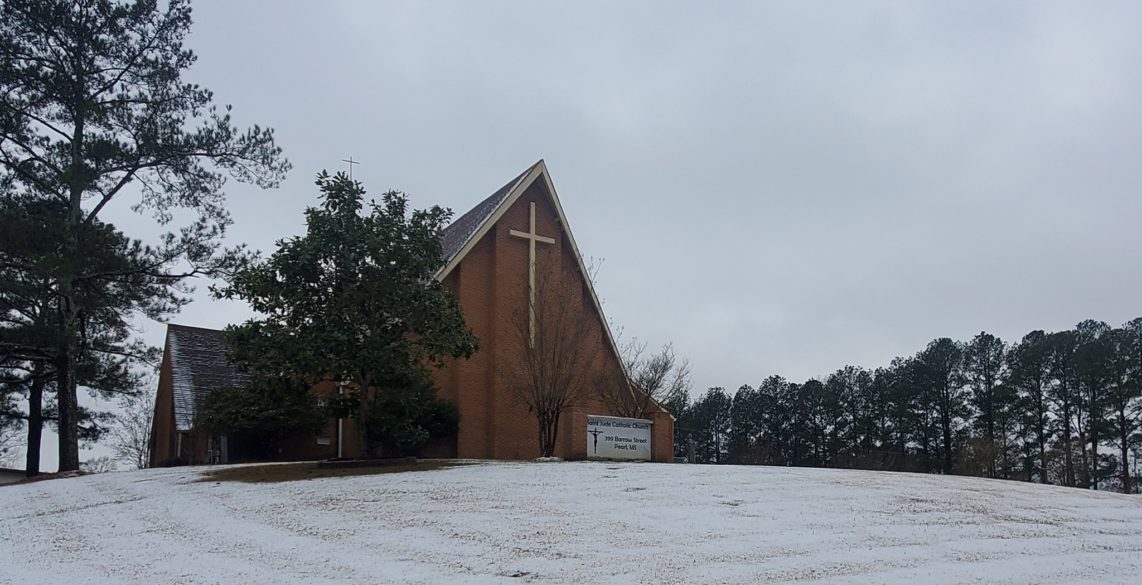
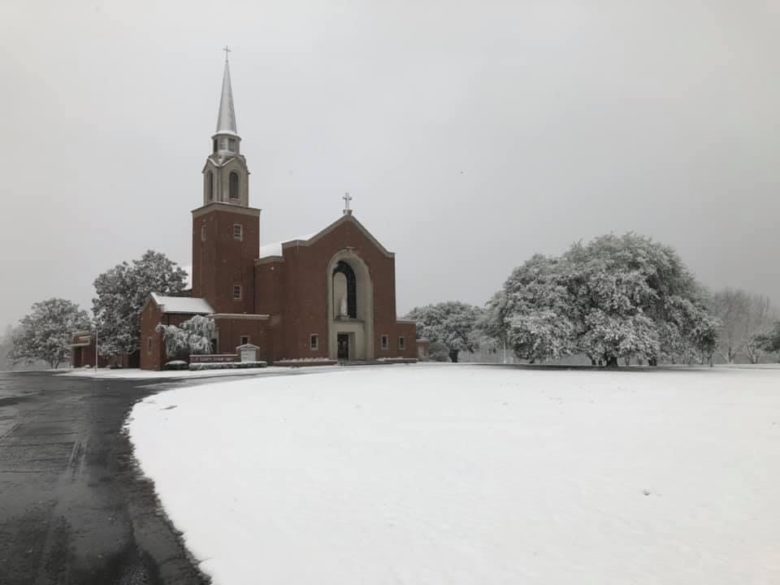



By Most Reverend José H. Gomez
LOS ANGELES – My prayers are with our new President and his family today.
I am praying that God grant him wisdom and courage to lead this great nation and that God help him to meet the tests of these times, to heal the wounds caused by this pandemic, to ease our intense political and cultural divisions, and to bring people together with renewed dedication to America’s founding purposes, to be one nation under God committed to liberty and equality for all.
Catholic bishops are not partisan players in our nation’s politics. We are pastors responsible for the souls of millions of Americans and we are advocates for the needs of all our neighbors. In every community across the country, Catholic parishes, schools, hospitals, and ministries form an essential culture of compassion and care, serving women, children, and the elderly, the poor and sick, the imprisoned, the migrant, and the marginalized, no matter what their race or religion.
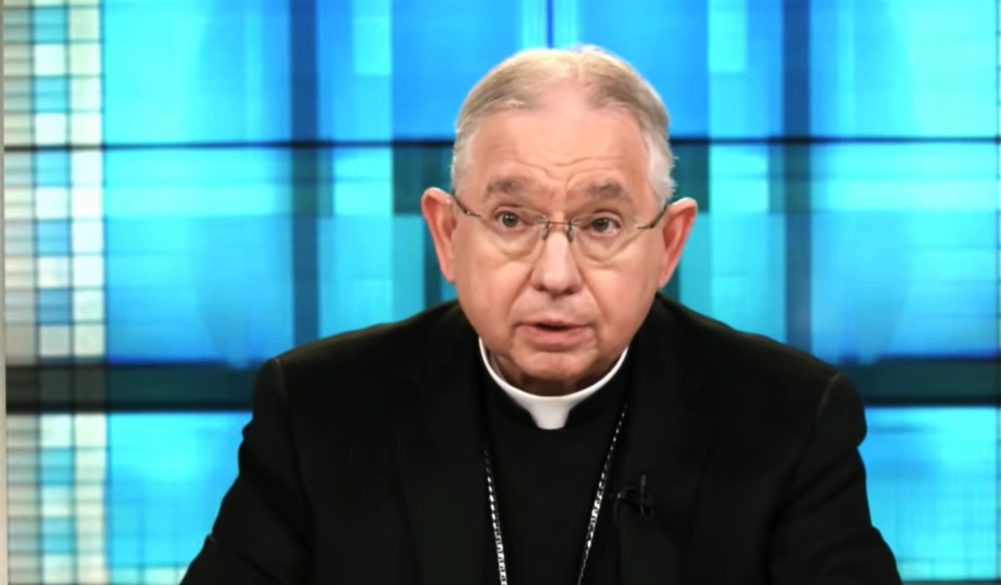
When we speak on issues in American public life, we try to guide consciences, and we offer principles. These principles are rooted in the Gospel of Jesus Christ and the social teachings of his Church. Jesus Christ revealed God’s plan of love for creation and revealed the truth about the human person, who is created in God’s image, endowed with God-given dignity, rights and responsibilities, and called to a transcendent destiny.
Based on these truths, which are reflected in the Declaration of Independence and Bill of Rights, the bishops and Catholic faithful carry out Christ’s commandment to love God and love our neighbors by working for an America that protects human dignity, expands equality and opportunities for every person, and is open-hearted towards the suffering and weak.
For many years now, the United States Conference of Catholic Bishops has tried to help Catholics and others of good will in their reflections on political issues through a publication we call Forming Consciences for Faithful Citizenship. The most recent edition addresses a wide range of concerns. Among them: abortion, euthanasia, the death penalty, immigration, racism, poverty, care for the environment, criminal justice reform, economic development, and international peace.
On these and other issues, our duty to love and our moral principles lead us to prudential judgments and positions that do not align neatly with the political categories of left or right or the platforms of our two major political parties. We work with every President and every Congress. On some issues we find ourselves more on the side of Democrats, while on others we find ourselves standing with Republicans. Our priorities are never partisan. We are Catholics first, seeking only to follow Jesus Christ faithfully and to advance his vision for human fraternity and community.
I look forward to working with President Biden and his administration, and the new Congress. As with every administration, there will be areas where we agree and work closely together and areas where we will have principled disagreement and strong opposition.
Working with President Biden will be unique, however, as he is our first president in 60 years to profess the Catholic faith. In a time of growing and aggressive secularism in American culture, when religious believers face many challenges, it will be refreshing to engage with a President who clearly understands, in a deep and personal way, the importance of religious faith and institutions. Mr. Biden’s piety and personal story, his moving witness to how his faith has brought him solace in times of darkness and tragedy, his longstanding commitment to the Gospel’s priority for the poor — all of this I find hopeful and inspiring.
At the same time, as pastors, the nation’s bishops are given the duty of proclaiming the Gospel in all its truth and power, in season and out of season, even when that teaching is inconvenient or when the Gospel’s truths run contrary to the directions of the wider society and culture. So, I must point out that our new President has pledged to pursue certain policies that would advance moral evils and threaten human life and dignity, most seriously in the areas of abortion, contraception, marriage, and gender. Of deep concern is the liberty of the church and the freedom of believers to live according to their consciences.
Our commitments on issues of human sexuality and the family, as with our commitments in every other area — such as abolishing the death penalty or seeking a health care system and economy that truly serves the human person — are guided by Christ’s great commandment to love and to stand in solidarity with our brothers and sisters, especially the most vulnerable.
For the nation’s bishops, the continued injustice of abortion remains the “preeminent priority.” Preeminent does not mean “only.” We have deep concerns about many threats to human life and dignity in our society. But as Pope Francis teaches, we cannot stay silent when nearly a million unborn lives are being cast aside in our country year after year through abortion.
Abortion is a direct attack on life that also wounds the woman and undermines the family. It is not only a private matter, it raises troubling and fundamental questions of fraternity, solidarity, and inclusion in the human community. It is also a matter of social justice. We cannot ignore the reality that abortion rates are much higher among the poor and minorities, and that the procedure is regularly used to eliminate children who would be born with disabilities.
Rather than impose further expansions of abortion and contraception, as he has promised, I am hopeful that the new President and his administration will work with the church and others of good will. My hope is that we can begin a dialogue to address the complicated cultural and economic factors that are driving abortion and discouraging families. My hope, too, is that we can work together to finally put in place a coherent family policy in this country, one that acknowledges the crucial importance of strong marriages and parenting to the well-being of children and the stability of communities. If the President, with full respect for the church’s religious freedom, were to engage in this conversation, it would go a long way toward restoring the civil balance and healing our country’s needs.
President Biden’s call for national healing and unity is welcome on all levels. It is urgently needed as we confront the trauma in our country caused by the coronavirus pandemic and the social isolation that has only worsened the intense and long-simmering divisions among our fellow citizens.
As believers, we understand that healing is a gift that we can only receive from the hand of God. We know, too, that real reconciliation requires patient listening to those who disagree with us and a willingness to forgive and move beyond desires for reprisal. Christian love calls us to love our enemies and bless those who oppose us, and to treat others with the same compassion that we want for ourselves.
We are all under the watchful eye of God, who alone knows and can judge the intentions of our hearts. I pray that God will give our new President, and all of us, the grace to seek the common good with all sincerity.
I entrust all our hopes and anxieties in this new moment to the tender heart of the Blessed Virgin Mary, the mother of Christ and the patroness of this exceptional nation. May she guide us in the ways of peace and obtain for us wisdom and the grace of a true patriotism and love of country.
(Archbishop José H. Gomez is the Archbishop of Los Angeles and President of the United States Conference of Catholic Bishops. He released this statement on Jan. 20 through the USCCB.)
CONGREGATION FOR THE DOCTRINE OF THE FAITH
The question of the use of vaccines, in general, is often at the center of controversy in the forum of public opinion. In recent months, this Congregation has received several requests for guidance regarding the use of vaccines against the SARS-CoV-2 virus that causes Covid-19, which, in the course of research and production, employed cell lines drawn from tissue obtained from two abortions that occurred in the last century. At the same time, diverse and sometimes conflicting pronouncements in the mass media by bishops, Catholic associations, and experts have raised questions about the morality of the use of these vaccines.
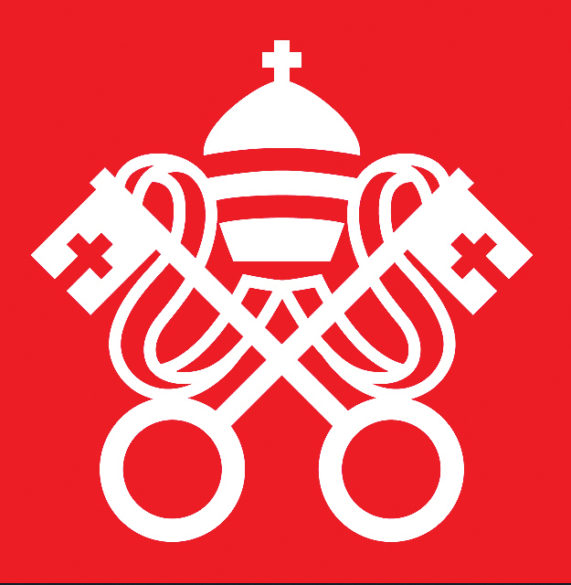
There is already an important pronouncement of the Pontifical Academy for Life on this issue, entitled “Moral reflections on vaccines prepared from cells derived from aborted human fetuses” (5 June 2005). Further, this Congregation expressed itself on the matter with the Instruction Dignitas Personae (September 8, 2008, cf. nn. 34 and 35). In 2017, the Pontifical Academy for Life returned to the topic with a Note. These documents already offer some general directive criteria.
Since the first vaccines against Covid-19 are already available for distribution and administration in various countries, this Congregation desires to offer some indications for clarification of this matter. We do not intend to judge the safety and efficacy of these vaccines, although ethically relevant and necessary, as this evaluation is the responsibility of biomedical researchers and drug agencies. Here, our objective is only to consider the moral aspects of the use of the vaccines against Covid-19 that have been developed from cell lines derived from tissues obtained from two fetuses that were not spontaneously aborted.
The Sovereign Pontiff Francis, at the Audience granted to the undersigned Prefect of the Congregation for the Doctrine of the Faith, on 17 December 2020, examined the present Note and ordered its publication.
Rome, from the Offices of the Congregation for the Doctrine of the Faith, on 21 December 2020, Liturgical Memorial of Saint Peter Canisius.
Luis F. Card. Ladaria, S.I. + S.E. Mons. Giacomo Morandi
Prefect Titular Archbishop of Cerveteri
Secretary
[1] Congregation for the Doctrine of the Faith, Instruction Dignitas Personae (8 th December 2008), n. 35; AAS (100), 884.
[2] Ibid, 885.
[3] Cfr. Pontifical Academy for Life, “Moral reflections on vaccines prepared from cells derived from aborted human fetuses”, 5th June 2005.
[4] Congregation for the Doctrine of the Faith, Instruct. Dignitas Personae, n. 35: “When the illicit action is endorsed by the laws which regulate healthcare and scientific research, it is necessary to distance oneself from the evil aspects of that system in order not to give the impression of a certain toleration or tacit acceptance of actions which are gravely unjust. Any appearance of acceptance would in fact contribute to the growing indifference to, if not the approval of, such actions in certain medical and political circles.”
[5] Cfr. Francis, Address to the members of the “Banco Farmaceutico” foundation, 19 September 2020.
By Bishop Joseph R. Kopacz, D.D.
On this past Sunday of the Word of God, the third Sunday in Ordinary time each year, we heard the summons of the Lord Jesus to his first disciples, Peter and Andrew, James and John, a call that is ever ancient and ever new. “The Kingdom of Heaven is at hand; reform your lives and believe in the Gospel.” (Mark 1:14-20) Events unfold rapidly in the Gospel of Mark.
In the space of half of the first chapter, the reader is blessed to know that the Good News is about Jesus Christ, the Son of God, who is then baptized, tempted in the desert, and propelled into daily life announcing the Kingdom of God. This Good News is revealed at the Lord’s baptism when the voice from heaven lovingly proclaims, “you are my beloved Son in whom I am well pleased.”

Reforming one’s life is about hearing the Lord, following him along the path of life, turning away from sin, and allowing him to transform our hearts and minds. This is the work of lifetime, but the call to holiness of life is daily.
The heart of the Good News is that we embrace our own identity as beloved daughters and sons of God, the crown of creation, made in the image and likeness of our creator. “If God is for us, who or what can be against us,” as St. Paul who was grasped by Christ, boldly writes. (Romans 8:31)
As the church began to grow and spread throughout the ancient world, the early Christians, in the face of martyrdom, but with minds and hearts transformed, witnessed to an astounding new way of living. Indeed, they preached the Good News to the poor, fed the hungry, welcomed the stranger, cared for the sick and the dying, buried the dead, shunned violence, and rejected the Roman customs of infanticide and abortion. While worshipping the Lord who called them from darkness into his marvelous light, they also witnessed to a profound respect for life that grew organically form faith in their crucified and risen Lord.
In every generation then, the disciples of the Lord, the church, proclaim this Good News of salvation, the gift for time and eternity. Against the backdrop of so many violent protests throughout 2020, culminating with the protest that morphed into the disgraceful assault on the hallowed halls of government, today, January 29, marks the anniversary of the March for Life. Faithful pilgrims on behalf of life have marched peacefully for nearly five decades, 100s of thousands each year. Thank you, Pro-Life activists, for your witness on behalf of life, and these days, for your witness to the integrity of the first amendment of our constitution, upholding the right to assemble peacefully. America, please take notice on both counts. In conclusion, the 2021 statement for the March for Life to be held virtually, portrays a profound and comprehensive respect for life.
“The protection of all of those who participate in the annual March, as well as the many law enforcement personnel and others who work tirelessly each year to ensure a safe and peaceful event, is a top priority of the March for Life. In light of the fact that we are in the midst of a pandemic which may be peaking, and in view of the heightened pressures that law enforcement officers and others are currently facing in and around the Capitol, this year’s March for Life will look different. The annual rally will take place virtually and we are asking all participants to stay home and to join the March virtually. We will invite a small group of pro-life leaders from across the country to march in Washington, DC this year. These leaders will represent pro-life Americans everywhere who, each in their own unique ways, work to make abortion unthinkable and build a culture where every human life is valued and protected. We are profoundly grateful for the countless women, men, and families who sacrifice to come out in such great numbers each year as a witness for life – and we look forward to being together in person next year. As for this year’s march, we look forward to being with you virtually. “The Kingdom of Heaven is at hand, repent and believe in the Gospel.”
Por Obispo Joseph R. Kopacz, D.D.
Este último domingo de la Palabra de Dios, el tercero del tiempo ordinario de cada año, escuchamos la llamada del Señor Jesús a sus primeros discípulos, Pedro, Andrés, Santiago y Juan, una llamada que es siempre antigua y siempre nueva. “Ya se cumplió el plazo señalado, y el reino de Dios está cerca. Vuélvanse a Dios y acepten con fe sus buenas noticias.” (Marcos 1:14-20). En el Evangelio de Marcos los eventos se desarrollan rápidamente.
En el espacio de la mitad del primer capítulo, el lector tiene la bendición de saber que la Buena Nueva se trata de Jesucristo, el Hijo de Dios, que luego fue bautizado, tentado en el desierto y lanzado a la vida diaria, siempre anunciando el Reino de Dios. Esta Buena Nueva se revela en el bautismo del Señor cuando la voz del cielo proclama amorosamente: “Tú eres mi Hijo amado en quien tengo complacencia”.
Reformar la vida se trata de escuchar al Señor, seguirlo por el camino de la vida, apartarnos del pecado y permitirle que transforme nuestros corazones y mentes. Este es el trabajo de toda una vida, pero el llamado a la santidad de la vida es diario.

El corazón de la Buena Nueva es que aceptamos nuestra propia identidad como hijas e hijos amados de Dios, la corona de la creación, hecha a imagen y semejanza de nuestro creador tal como San Pablo, a quien Cristo tomó, escribe con valentía, “¿Qué más podremos decir? ¡Que si Dios está a nuestro favor, nadie podrá estar contra nosotros!“ (Romanos 8:31)
A medida que la iglesia comenzó a crecer y extenderse por todo el mundo antiguo, los primeros cristianos, enfrentados al martirio, pero con mentes y corazones transformados, fueron testigos de una nueva forma asombrosa de vida. De hecho, predicaron la Buena Nueva a los pobres, alimentaron a los hambrientos, dieron la bienvenida al extranjero, cuidaron a los enfermos y moribundos, enterraron a los muertos, evitaron la violencia y rechazaron las costumbres romanas del infanticidio y el aborto. Mientras adoraban al Señor que los llamó de las tinieblas a su luz maravillosa, también fueron testigos de un profundo respeto por la vida que creció orgánicamente a partir de la fe en su Señor crucificado y resucitado.
En cada generación, entonces, los discípulos del Señor, la iglesia, proclaman esta Buena Nueva de salvación, el don para el tiempo y la eternidad. En el contexto de tantas protestas violentas a lo largo de 2020, que culminaron con la protesta que se transformó en el vergonzoso asalto a los sagrados pasillos del gobierno, hoy 29 de enero se conmemora el aniversario de la Marcha por la Vida. Los peregrinos fieles en nombre de la vida han marchado pacíficamente durante casi cinco décadas, cientos de miles cada año. Gracias, activistas provida, por su testimonio en nombre de la vida y, en estos días, por su testimonio de la integridad de la primera enmienda de nuestra constitución, que defiende el derecho a reunirse pacíficamente. América, toma nota de ambos aspectos. En conclusión, la declaración de 2021 de la Marcha por la Vida que se realizará virtualmente refleja un profundo y completo respeto por la vida:
“La protección de todos los que participan en la Marcha anual, así como de los muchos miembros del personal de las fuerzas del orden público y otras personas que trabajan incansablemente cada año para garantizar un evento seguro y pacífico, es una de las principales prioridades de la Marcha por la Vida. A la luz del hecho de que estamos en medio de una pandemia que puede estar llegando a su punto máximo, y en vista de las mayores presiones que los agentes del orden y otras personas enfrentan actualmente en el Capitolio y sus alrededores, la Marcha por la Vida de este año se verá diferente. El mitin anual se llevará a cabo virtualmente y pedimos a todos los participantes que se queden en casa y se unan a la Marcha virtualmente. Invitaremos a un pequeño grupo de líderes provida de todo el país a marchar en Washington, DC este año. Estos líderes representarán a los estadounidenses provida en todas partes que, cada uno a su manera única, trabajan para hacer impensable el aborto y construir una cultura donde cada vida humana sea valorada y protegida. Estamos profundamente agradecidos por las innumerables mujeres, hombres y familias que se sacrifican para salir en tan gran número cada año como testigos de por vida, y esperamos estar juntos en persona el próximo año. En cuanto a la marcha de este año, esperamos estar con ustedes virtualmente. “El Reino de los Cielos está cerca, arrepiéntete y cree en el Evangelio”.
By Carol Glatz
VATICAN CITY (CNS) – Unity requires prayer, love and fighting the devil, who always sows division, Pope Francis said.
The devil “fosters division everywhere and in every way” by tempting people “with the weaknesses of our brothers and sisters. He is astute: He magnifies others’ mistakes and defects, sows discord, provokes criticism and creates factions,” the pope said Jan. 20 during his weekly general audience.
God, on the other hand, “has another way. He takes us as we are, different, sinners and always nudges us toward unity,” he said.
In his audience talk, livestreamed from the library of the Apostolic Palace, the pope reflected on the Week of Prayer for Christian Unity, celebrated Jan. 18-25. The theme for the 2021 celebration, “Abide in my love … You shall bear much fruit,” is taken from the Gospel of St. John (15:1-17).
“The root of communion is the love of Christ, who makes us overcome our prejudices to see in others a brother or sister to be loved always,” the pope said.
In fact, the pope invited everyone to discover other Christian denominations – their traditions and their history – and see them as “gifts from God” present in one’s neighborhood or town.
“Let us begin to pray for them and, when possible, with them. We will thus learn to love and appreciate them,” he said.
The pope said that at this time of “serious hardship” in the world, the prayer for Christian unity was even more necessary.
“It is urgent that we set aside particular interests to promote the common good and so our good example is fundamental: It is essential that Christians pursue the path toward full visible unity.”
When Jesus prayed that his disciples “may all be one,” he was not ordering them to be united, but was praying “to the Father for us,” the pope said.
“This means that we are not able to achieve unity by ourselves, with our own strength. Above all, unity is a gift, it is a grace to be requested through prayer,” he said.
Unity is a difficult task, not just for Christian communities, but for each individual, he said.
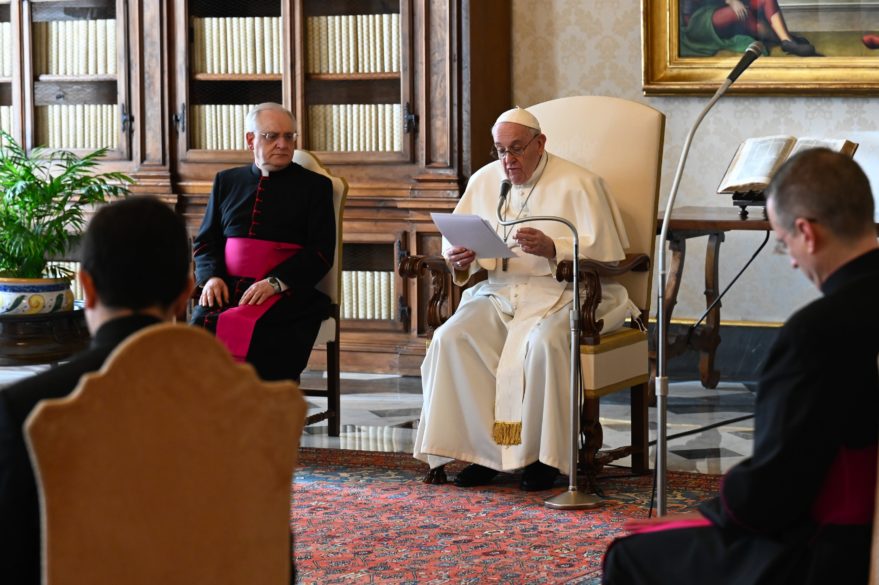
“Even the Apostle Paul felt a lacerating conflict within himself: wanting the good but inclined toward evil,” he said.
The root of so many divisions in the world – divisions in the family, society, a nation and among believers – is found inside the human heart, Pope Francis said.
From these internal struggles flow many of the conflicts and tensions in society, which is why “the solution to these divisions is not to oppose someone, because discord generates more discord. The true remedy begins by asking God for peace, reconciliation, unity.”
Praying for unity also means fighting “because our enemy, the devil, is the one who divides,” he added.
People need to ask themselves how they live each day and whether “we nurture conflict or fight for greater unity with the tools that God has given us: prayer and love.”
Christians also need to ask, “Do I pray for unity? It is Jesus’ will but, if we inspect the intentions for which we pray, we would probably realize that we have prayed little, perhaps never, for Christian unity. And yet, the world’s faith depends on it,” the pope said.
As you may know, my professional background is in sports media, but you may not know that I love science fiction/fantasy books and movies. These include but are not limited to books and films like Lord of the Rings, Harry Potter and all the movies in the cash cow that is the Marvel Cinematic Universe. You may not know the MCU by this acronym, but you surely have seen or at least heard of movies like Ironman, Thor, Avengers, etc., all based on Marvel comic books. The genius of these movies lies in the way they have been rolled out over the years. They are all a part of a larger story arc (or series of arcs) that build on one another. If you watched Avengers: Infinity War, you not only were encouraged to see what happened next in Avengers: Endgame, but you also could get valuable storyline information from less epic films like Ant-Man and the Wasp and other movies set in the same Cinematic Universe. It really is an amazing storytelling vehicle that has raked in billions of dollars for Marvel’s parent company Disney.
Recently the producers of the Marvel movies told the world that “Phase Three” of the MCU was wrapping up, and that “Phase Four” would soon begin. These labels may be of little significance to those outside the fandom of these movies, but they are helpful to those who are diligently following along. The end of “Phase Three” meant that many of the character arcs and major plot lines of the past several films had been resolved, and so “Phase Four” will be trying to keep the larger story going while introducing new characters and plots to the fanbase. And because all of you have so graciously followed along with the story of the Department of Vocations over the past year, may I present to you: Phase Two of my term as Vocation Director in the Diocese of Jackson.
Phase One included me getting my feet on the ground and traveling to different parishes meeting with priests and making plans. I also wanted to lay out my vision of discernment in our diocese: the importance of visiting the seminary, an understanding that discernment most properly happens while someone is in formal priestly or religious formation, etc. I see Phase Two as a bridge between the pandemic and a more normal future where we can gather together in groups once again. The key component of Phase Two will be “Prediscernment Prayer Nights,” which will consist of holy hours for vocations in each deanery during the winter and early spring. I will host these hours of adoration and benediction at two parishes in each deanery. Each parish was chosen to maximize the space available for worship and to minimize travel for those who want to attend. I will be asking pastors and parish leaders in each deanery to personally invite men and women who they believe might be called to priesthood or religious life to attend these events, and I ask that you do the same. This is a way for me to meet more folks interested in discernment at a time when things like retreats and other gatherings simply are not possible. Thus far I have Deanery I and Deanery II dates and times on the calendar. Check out my column in future editions as I schedule more of these events. Please pray for the success of my own “Phase Two!”
Father Nick travels a lot, but he puts his homilies on the internet for those who would like to hear them! Go to www.jacksonpriests.com/podcasts each Sunday evening to listen. You can also find out all you want to know about our Vocation office at www.jacksonpriests.com
Vocations Events
Prediscernment Prayer Nights: Deanery I – Feb. 9 at St. Richard Jackson, 6-7 p.m.; Feb. 10 at St. Paul Vicksburg, 6-7 p.m. and Deanery II – Feb. 23 at St. Alphonsus McComb, 6-7 p.m.; Feb. 24 at St. Mary Basilica Natchez, 6-7 p.m. Questions? Email nick.adam@jacksondiocese.org
IN EXILE
By Father Ron Rolheiser, OMI
“You can safely assume you’ve created God in your own image when it turns out that God hates all the same people you do.” – Anne Lamott
Those are words worth contemplating, on all sides of the political and religious divide today. We live in a time of bitter division. From our government offices down to our kitchen tables there are tensions and divisions about politics, religion, and versions of truth that seem irreparable. Sadly, these divisions have brought out the worst in us, in all of us. Common civility has broken down and brought with it something that effectively illustrates the biblical definition of the “diabolic” – widespread lack of common courtesy, disrespect, demonization and hatred of each other. All of us now smugly assume that God hates all the same people we do. The polarization around the recent U.S. elections, the storming of the U.S. Capitol buildings by a riotous mob, the bitter ethical and religious debates about abortion, and the loss of a common notion of truth have made clear that incivility, hatred, disrespect and different notions of truth rule the day.

Where do we go with that? I am a theologian and not a politician or social analyst so what I say here has more to do with living out Christian discipleship and basic human maturity than with any political response. Where do we go religiously with this?
Perhaps a helpful way to probe for a Christian response is to pose the question this way: what does it mean to love in a time like this? What does it mean to love in a time when people can no longer agree on what is true? How do we remain civil and respectful when it feels impossible to respect those who disagree with us?
In struggling for clarity with an issue so complex, sometimes it can be good to proceed via the Via Negativa, that is, by first asking what should we avoid doing. What should we not do today?
First, we should not bracket civility and legitimize disrespect and demonization; but we should also not be unhealthily passive, fearful that speaking our truth will upset others. We may not disregard truth and let lies and injustices lie comfortable and unexposed. It is too simple to say that there are good people on both sides in order to avoid having to make real adjudications vis-à-vis the truth. There are sincere people on both sides, but sincerity can also be very misguided. Lies and injustice need to be named. Finally, we must resist the subtle (almost impossible to resist) temptation to allow our righteousness morph into self-righteousness, one of pride’s most divisive modalities.
What do we need to do in the name of love? Fyodor Dostoevsky famously wrote that love is a harsh and fearful thing, and our first response should be to accept that. Love is a harsh thing and that harshness is not just the discomfort we feel when we confront others or find ourselves confronted by them. Love’s harshness is felt most acutely in the (almost indigestible) self-righteousness we have to swallow in order to rise to a higher level of maturity where we can accept that God loves those we hate just as much as God loves us – and those we hate are just as precious and important in God’s eyes as we are.
Once we accept this, then we can speak for truth and justice. Then truth can speak to power, to “alternative truth,” and to the denial of truth. That is the task. Lies must be exposed, and this needs to occur inside our political debates, inside our churches, and at our dinner tables. That struggle will sometimes call us beyond niceness (which can be its own mammoth struggle for sensitive persons). However, while we cannot always be nice, we can always be civil and respectful.
One of our contemporary prophetic figures, Daniel Berrigan, despite numerous arrests for civil disobedience, steadfastly affirmed that a prophet makes a vow of love, not of alienation. Hence, in our every attempt to defend truth, to speak for justice, and to speak truth to power, our dominant tone must be one of love, not anger or hatred. Moreover, whether we are acting in love or alienation will always be manifest – in our civility or lack of it. No matter our anger, love still has some non-negotiables, civility and respect. Whenever we find ourselves descending to adolescent name-calling, we can be sure we have fallen out of discipleship, out of prophecy, and out of what is best inside us.
Finally, how we will respond to the times remains a deeply personal thing. Not all of us are called to do the same thing. God has given each of us unique gifts and a unique calling; some are called to loud protest, others to quiet prophecy. However, we are all called to ask ourselves the same question: given what is happening, what is love asking of me now?
(Oblate Father Ron Rolheiser is a theologian, teacher and award-winning author. He can be contacted through his website www.ronrolheiser.com.)
From the hermitage
By sister alies therese
The battle is on. Swords are drawn. All seems so violent and harsh. Yet we are told prayer is a battle. We might even have a “war room” in our home. Life is not easy. We just must get on with it! Really?
“Consider how Jesus Christ teaches us to be humble, by making us see that our virtue does not depend on our work alone but from grace on high. Jesus commands each of the faithful who prays to do so universally, for the whole world. He did not say, ‘thy will be done in me or in us,’ but ‘on earth,’ the whole earth, so that error might be banished from it, truth take root in it, all vice be destroyed on it, virtue flourish on it, and earth no longer different from heaven.” St. John Chrysostom
“We have not been commanded to work, to keep watch and to fast constantly, but it has been laid down that we are to pray without ceasing.” (Desert Fathers)
Father Donal Dorr, an Irish missionary priest wrote many books and in his Spirituality and Justice, 1984, he wrote this:
“People who do not have a simple and spontaneous trust in God are likely to take themselves and their own efforts too seriously. Their dedication to human liberation is liable to be too earnest, too blinkered, perhaps too self-righteous. Hence the importance of childlike prayer. On the other hand, like many others who believe that God has called us to work for justice and human liberation, I am constantly dismayed that so many Christians use prayer as a substitute for action … prayer and action are not alternatives, rather they complement each other. It is very hard to find anybody who has a passionate commitment to both.”
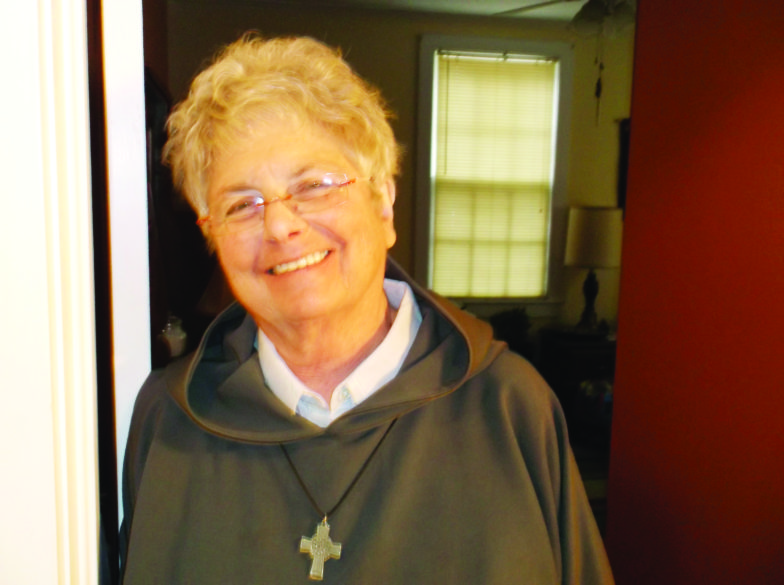
We recently celebrated MLK Day, perhaps not in person as we would have liked, but at least in prayer. I think he might have been a person of this passion, praying and working for justice. He would have wept over the attempt to take over the Capitol and government and to hurt, if not kill, leaders. One wonders. A new President on Jan. 20 was like a bit of fresh air but we are certainly not done! The passionate call to justice requires unceasing prayer. Non-violence is difficult.
“Those who ‘pray without ceasing’ unite prayer to works and good works to prayer. Only in this way can we consider as realizable the principle of praying without ceasing.” Origen
In the CCC 1896 we find: “Where sin has perverted the social climate, it is necessary to call for conversion of hearts and appeal to the grace of God. Charity urges just reforms. There is no solution to the social question apart from the Gospel.” Further in 1889: “Without the help of grace, [wo]men would not know how to ‘discern the often narrow path between the cowardice which gives into evil, and the violence which under the illusion of fighting evil only makes things worse.’ Charity is the greatest social commandment. It respects others and their rights. It requires the practice of justice, and it alone makes us capable of it.”
Sin on many levels has perverted our social climate and we look to those who do justice to guide us. Just look around. How do we find the illusions? How do we detect our own complicity? How do we discover those things in our governments (meant to be of service for the people) that oppress or repress? One way we already considered, unceasing prayer. A second way is to consider at least the three main requirements of the ‘common good:’ 1) respect for the person, 2) social well-being and development of culture, 3) peace, stability and security of a just order.” (CCC 1907)
Finally, we listen to Pope St. John XXIII where he reminds us: “Human society can be neither well-ordered nor prosperous unless it has some people invested with legitimate authority to preserve its institutions and to devote themselves as far as is necessary to work and care for the good of all.” (CCC 1897)
There is a lot of fear around. Many fear government take-overs, the pandemic, being alone, or even one’s own health – mental and physical. I can’t say that just saying, ‘go away fear,’ will do it, but I can suggest paying attention to your relationship with Jesus in prayer and the works for common good/justice will put us back on track. This is no hoax. This is no joke. This is the real deal. The call to holiness requires everything.
BLESSINGS.
(Sister alies therese is a vowed Catholic solitary who lives an eremitical life. Her days are formed around prayer, art and writing. She is author of six books of spiritual fiction and is a weekly columnist. She lives and writes in Mississippi.)
Guest column
By James Tomek, Ph.D.
In honor of our national memorial of Martin Luther King, Bishop Joseph Kopacz had our diocese sponsor a workshop “The Fight Against Racism: the Past, Present, and Future Hope of the Church,” led by Bishop Shelton Fabre, an expert on cultural diversity and Catholic African American Relations. He approached our confrontation against the sin of racism with less emphasis on civil rights legislation, focusing more on converting our hearts to do the right thing.
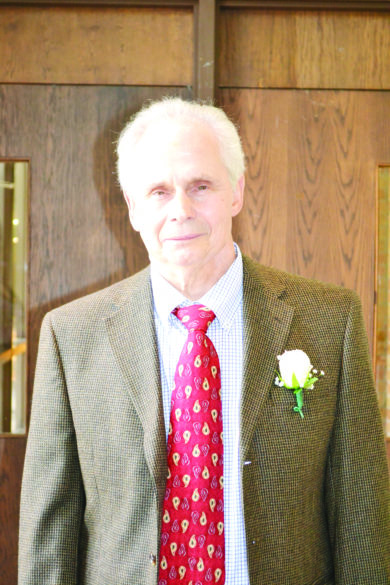
He started with a review of three earlier Pastoral Letters by the Bishops Council (USCCB) that condemned racism but noting that they had little effect in inspiring homilies about racial inequality and human dignity. Catholics should be responding equally to the sins of racism as they do against abortion.
Bishop Fabre outlined a more recent document, “Open Wide Your Hearts: The Enduring Call to Love” (2018), of which he is a major author. Bishop Shelton then encouraged us to follow the prophet Micah’s procedure.
First, one does justice. Since we are all created in the image and likeness of God, we must root out the sin of racism that destroys human dignity, with hatred killing possibilities of communion. Laws are a start, but real conversion comes when our hearts tell us to do the right thing.
This concept clarifies for me the paradox of Immanuel Levinas’ study of the Talmud, where Jews do the law before they know it. I also understand better Paul’s meaning of putting Faith above the Law. Faith is our attitude to do justice. Micah’s next step is to love goodness – practiced by developing homilies and welcoming minorities in our communities. “Walking humbly” is the last step in Micah’s process where we try to set a good example by confronting our own racism.
Before providing resources, Bishop Fabre sets the tone by changing slightly the parable of the workers in the vineyard (Matthew 20:1-16). The workers, who had worked all day, resented the late arrivers being paid the same. The Bishop edits the complaint from “you have paid them equal to us” to “you have made them equal to us.”
Deep down, we humans like to feel superior to some groups of people (the glamor of sin that we reject in our baptismal vows) – a sin against human dignity. Again, we legislate civil rights, without converting our hearts. The session concludes with lists of resources, reminding us of other objects of racism with Asians and Latinos, along with specific subject areas, like housing, jobs, prison and the death penalty.
Finally, Bishop Fabre encourages preaching the evils of racism. We are confused like the disciples at Emmaus. We all need to hear Jesus’s Word and be properly catechized – meaning that we need to study! Racism ends in hatred, undercutting any possibility of unity. Some people react negatively against “Black Lives Matter” thinking that “All Lives Matter.” The Bishop corrects this attitude with an example. All houses matter, but the one on fire matters most. As a former lifeguard, I will add that a struggling, drowning swimmer matters first.
How can I speak against racism to my colleagues in Rosedale? If I think that I am not a racist, I am one. The way out is to confront my racism – which brings me to Palisades Amusement Park at age 14 where I worked at a food stand. The park was near the George Washington Bridge – and thus New York City. Every Sunday would bring huge crowds. Puerto Ricans would line up 10 deep, ordering hotdogs and lemonades, in a language that was foreign to me – and irritating. My colleagues and I, while not ridiculing people openly, would make fun. Bishop Fabre would say that we were affirming our superiority over these people. I am not proud of my attitude then and hope for Purgatory.
One purge came later at a conference where a Mexican colleague and I were discussing Voltaire. I told him that I thought his degree was in Spanish because he was from Cancun and then confessed that if I, an English speaker, can study French, why not he, a Spanish speaker, also switch cultures. We finished in academic unity.
PS. I am a Lay Ecclesial Minister at Sacred Heart in Rosedale and a former French and English teacher at Delta State University. I attended the workshop via Zoom. I want to add that I have heard my Sacramental Ministers and Mentors (Fathers Kent Bowlds, Thomas Mullally and Sebastian Myladiyil) speak about and act against racism and have read pertinent articles in our diocesan paper. The tense frightening times though suggest that we take a bigger stand.
(James Tomek is a retired language and literature professor at Delta State University who is currently a Lay Ecclesial Minister at Sacred Heart in Rosedale and also active in RCIA at Our Lady of Victories in Cleveland.)